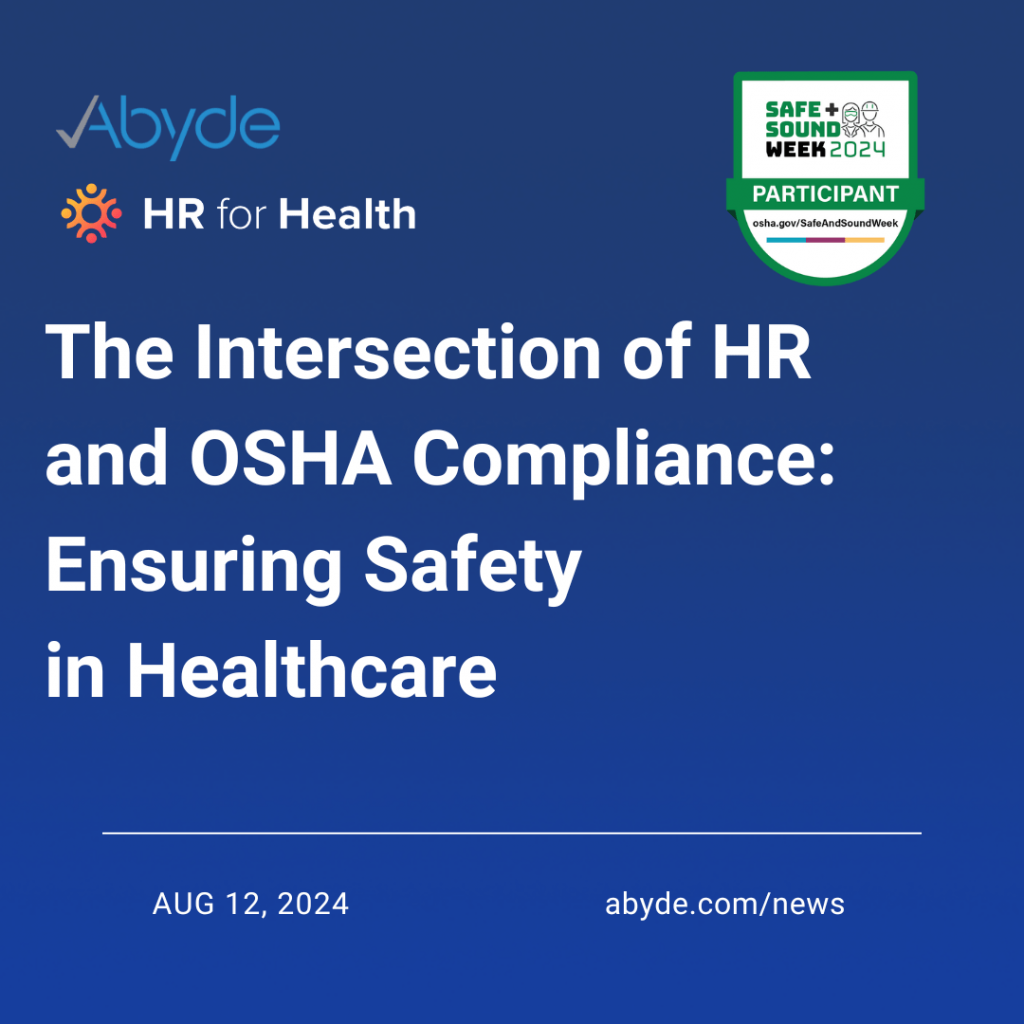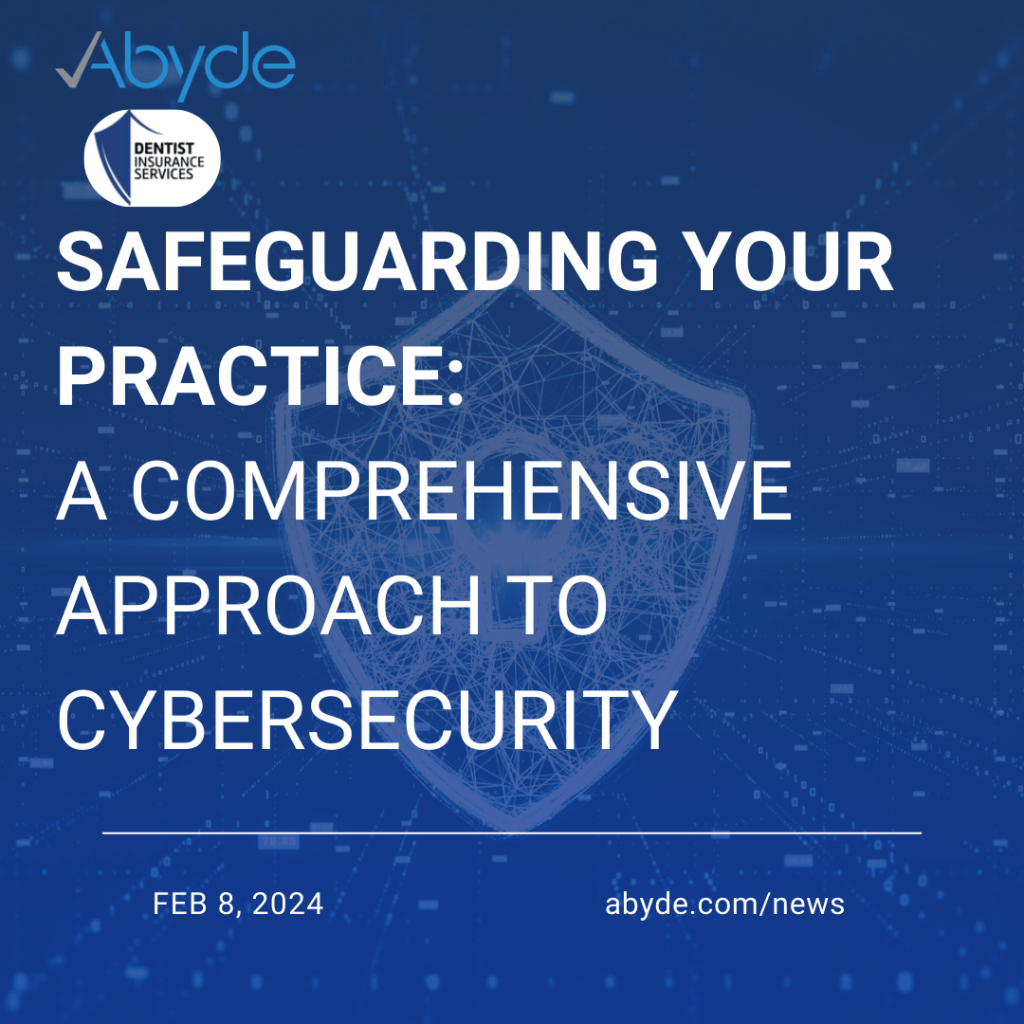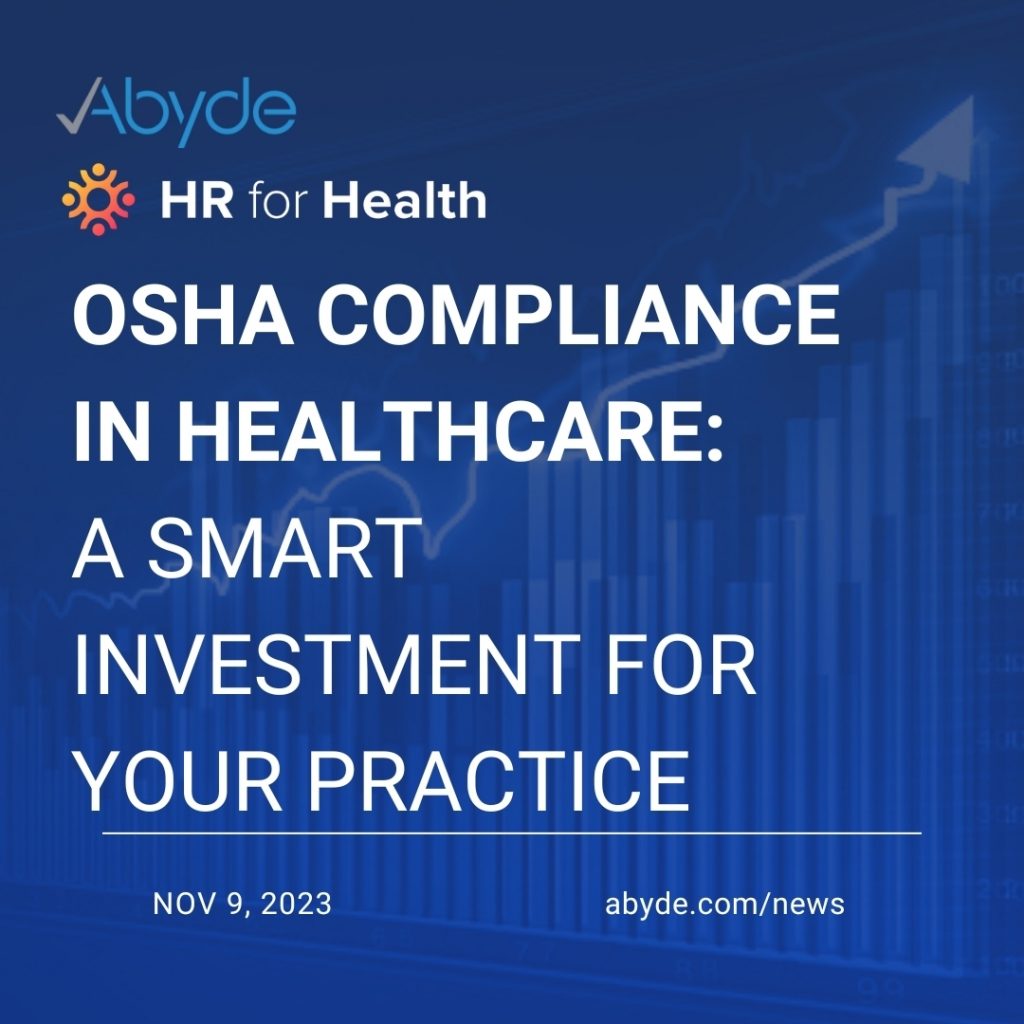August 12, 2024 This was contributed by HR for Health for OSHA’s Safe + Sound Week At HR for Health, OSHA compliance is a frequent and critical topic of discussion with our clients. As an HR company focused on supporting independent healthcare practices, we understand the importance of taking compliance, training, documentation, and safety seriously. Whether your practice is large or small, adhering to OSHA standards is not just about following the rules—it’s about protecting your employees and fostering a safe work environment that benefits everyone. Compliance laws can seem overwhelming, but it’s a non-negotiable part of running a healthcare practice. Non-compliance can lead to significant penalties, not to mention the time-consuming and expensive lawsuits that could arise if an employee or patient is injured. Beyond the financial implications, a commitment to safety and compliance contributes to a healthier, more productive workplace. But how do you ensure your practice stays compliant without getting bogged down in administrative tasks? That’s where HR for Health and Abyde come in. Together, we provide a comprehensive solution that simplifies the complex worlds of OSHA and employment law compliance, making it manageable for practices of all sizes. Why OSHA Compliance Matters OSHA (Occupational Safety and Health Administration) compliance is about more than just avoiding fines. It’s about creating a workplace where your employees feel safe and supported, which in turn leads to better patient care. Compliance involves familiarizing yourself with OSHA regulations, training your employees, and maintaining accurate records of any incidents or hazards. At HR for Health, we see firsthand how often OSHA compliance comes up in our conversations with clients. It’s a constant concern, and rightly so—OSHA compliance isn’t a one-time effort but an ongoing process. That’s why we’ve integrated powerful features into our platform to help you stay compliant effortlessly. Simplifying Compliance with HR for Health Our software is designed to automate and streamline many of the tasks associated with OSHA compliance. For example, our Continued Education automated alerts and updates ensure that your team stays on top of mandatory training and certifications. This feature is crucial because it ensures that your employees are always up-to-date with the latest safety protocols, which helps in maintaining a safe workplace. Documentation is another critical aspect of OSHA compliance. Your practice needs to keep detailed records of any work-related injuries or illnesses, as well as potential hazards. HR for Health offers unlimited e-document storage, so you never have to worry about running out of space or losing important documents. This secure storage solution means that all your compliance-related documents are organized, easily accessible, and safe from loss or damage. But compliance isn’t just about keeping records. It’s also about communication and ensuring that everyone in your practice is on the same page. Our platform includes integrated messaging, task management, and performance reviews, which help facilitate clear communication and make sure that no critical tasks are overlooked. This holistic approach to compliance ensures that your practice runs smoothly and that your employees are always aware of their responsibilities. Partnering with Abyde for a Complete Solution While HR for Health handles many of the HR aspects of compliance, we’ve partnered with Abyde to provide a complete OSHA compliance solution. Abyde’s platform is designed specifically to help healthcare practices navigate the intricacies of OSHA regulations. Their OSHA checklist is an excellent starting point, helping you identify which regulations apply to your practice and what steps you need to take to comply. Abyde also simplifies the training process. OSHA training is essential for ensuring that your employees understand safety protocols and know how to respond in case of an emergency. Abyde’s platform makes this training straightforward for managers and easy for employees to follow, reducing the administrative burden on your practice. Once your employees are trained, Abyde helps you maintain compliance with their tools for documenting safety and health incidents. This includes managing Work-Related Injury & Illness Logs and Sharps Injury Logs, which are critical for demonstrating compliance during an OSHA inspection. Creating a Culture of Safety Compliance isn’t just about avoiding penalties—it’s about creating a culture of safety within your practice. By working with HR for Health and Abyde, you’re taking proactive steps to ensure that your workplace is as safe and efficient as possible. This not only protects your employees and patients but also enhances the overall productivity and morale of your team. OSHA compliance is a vital component of running a successful healthcare practice. By leveraging the combined strengths of HR for Health and Abyde, you can simplify this complex process and focus on what truly matters—caring for your patients and growing your practice. Ready to take your practice’s OSHA compliance to the next level? Visit HR for Health and Abyde to learn how our platforms can help your practice succeed.
Safeguarding Your Practice: A Comprehensive Approach to Cybersecurity
February 12, 2024 The following blog was co-written with Abyde’s partner, Carrie Millar at Dentist Insurance Services. If you would like more information on Dental Insurance Services, please click here to visit their website. In an era where technology plays a pivotal role in healthcare practices, ensuring the security of sensitive patient information is paramount. Cybersecurity threats pose a significant risk to medical practices, and adopting a multi-faceted approach is crucial to safeguard against potential breaches. This article explores the three key components to cyber safeguarding your practice: Strong IT for prevention, a Formal HIPAA compliance program, and Cyber Liability Insurance. 1. Strong IT for Prevention The foundation of any robust cybersecurity strategy is a well-built IT infrastructure. Prevention is the first line of defense against cyber threats. Implementing strong IT measures involves securing networks, regularly updating software and systems, and employing robust firewalls and antivirus solutions. Encryption of sensitive data both in transit and at rest adds an extra layer of protection. Regularly monitoring network activity and promptly addressing any anomalies can help identify potential security breaches early on. Employee training on cybersecurity best practices is equally essential, as human error remains a significant factor in cyber incidents. By investing in strong IT measures, practices can significantly reduce the risk of unauthorized access and data breaches. 2. A Formal HIPAA Compliance Program Compliance with the Health Insurance Portability and Accountability Act (HIPAA) is mandatory for healthcare providers, and it forms a critical aspect of cybersecurity. HIPAA compliance programs, such as Abyde (www.abyde.com), provide a structured framework for ensuring that your practice adheres to the stringent regulations in place. These programs offer comprehensive training for employees, covering topics such as data handling, password management, and recognizing potential phishing attempts. Regular audits and assessments help identify areas of improvement and ensure ongoing compliance. By instilling a culture of compliance within your practice, you not only protect patient information but also mitigate the risk of legal consequences associated with HIPAA violations. 3. Cyber Liability Insurance While prevention and compliance measures significantly reduce the likelihood of a cyber incident, it is crucial to acknowledge that no system is entirely impervious to attacks. Cyber Liability Insurance acts as a safety net in the event of a security breach, providing financial assistance to cover the costs associated with the aftermath. Make sure your comprehensive cyber liability insurance policy includes business income coverage, forensic investigation costs, public relations costs, as well as third-party liability. A great example of this is the Coalition Insurance policy sold by insurance broker Healthcare Professional Insurance Services (www.joinhpis.com) The average cost of a cyber-attack has surged in recent years to almost $400,000 per location and an average of 9 closed business days, making Cyber Liability Insurance an indispensable component of a comprehensive cybersecurity strategy. Having this safety net allows practices to recover more swiftly and continue providing uninterrupted services to patients.
OSHA Compliance in Healthcare: A Smart Investment for Your Practice
November 9, 2023 The following blog was co-written with Abyde’s HR partner, HR for Health. If you would like more information on HR for Health, please click here to visit their website. As a practice owner or healthcare employer, it is essential to prioritize the safety and well-being of your employees. One effective way to achieve this is by providing your team with proper Occupational Safety and Health Administration (OSHA) training. However, the cost of such training may deter some employers from investing in it. HR for Health team’s up with compliance partner Abyde to explore the nuances of OSHA training and the benefits of compensating your employees for their time spent training. OSHA in Healthcare: Navigating the Compliance Maze OSHA is a federal agency that’s all about keeping workplaces safe and healthy. In the healthcare world, this translates to ensuring the safety of both employees and patients. OSHA sets the rules, regulations, and guidelines that healthcare providers must follow to maintain a safe working environment. Requirements for Healthcare Providers Healthcare providers must adhere to OSHA regulations to ensure the well-being of everyone in the facility. This involves a multitude of requirements, from infection control to safe handling of hazardous materials, to reducing workplace violence. Compliance with OSHA standards is not just a box to tick; it’s about safeguarding the lives and health of patients and employees. The Crucial Connection to Employee Training and Retention Now, here’s where it gets interesting. Effective training and compliance with OSHA regulations play a pivotal role in employee training and retention. When healthcare providers prioritize OSHA training, they signal a commitment to employee well-being. This commitment, in turn, results in a happier, healthier, and more loyal workforce. Investing in comprehensive OSHA training demonstrates that you value your employees’ safety. This not only creates a positive work culture but also significantly impacts employee retention. Employees who feel secure and well-cared for are more likely to stay with your healthcare practice, reducing turnover rates and the costly process of recruiting and training new staff. Additionally, by equipping your employees with the necessary knowledge and skills to work safely, you can significantly reduce the risk of incidents occurring on the job. Consequently, this can save your company money in the long run, as workplace accidents lead to expensive workers’ compensation claims and lost productivity. The Legal Perspective According to HR for Health, compensating employees for OSHA training is not only a wise business decision but may also be required by law. Under the Fair Labor Standards Act (FLSA), employers must pay employees for their time spent in training directly related to their job duties. Therefore, if you require employees to complete OSHA training as part of their responsibilities, you must compensate them for the time spent in training. On the flip side… Employers may choose to provide a different rate of pay for training, but it’s left up to employers to decide if their training falls under certain criteria to provide a different rate of pay versus their regular rate of pay. These are the criteria points that must be met: It is imperative that you clearly outline the alternate rate of pay in your employee handbook, which cannot be less than minimum wage. How Abyde Keeps You Compliant Abyde, a provider of HIPAA compliance solutions, emphasizes the importance of OSHA training for healthcare organizations. In addition to reducing the risk of workplace accidents, OSHA training helps healthcare providers comply with HIPAA regulations. By ensuring that employees are trained on proper handling and disposal of hazardous materials, healthcare organizations can avoid costly fines and penalties for non-compliance. Abyde’s key features include: For more information on Abyde and how they work with your healthcare practice, please visit https://abyde.com/. Track Employee Training with HR for Health HR for Health is a comprehensive human resources platform designed specifically for healthcare professionals. Key training tracking features include: In conclusion, compensating employees for OSHA training is a wise investment for employers who prioritize the safety and well-being of their team members. Not only does it help prevent workplace accidents and injuries, but it also boosts employee morale and job satisfaction. As HR for Health and Abyde suggest, employers should be aware of their legal obligations and take steps to ensure that employees are properly compensated for their time spent in training.


